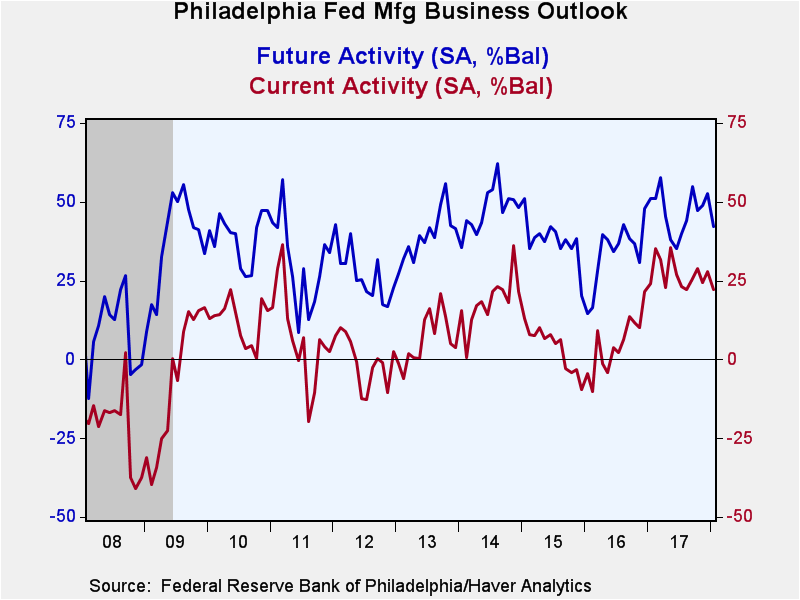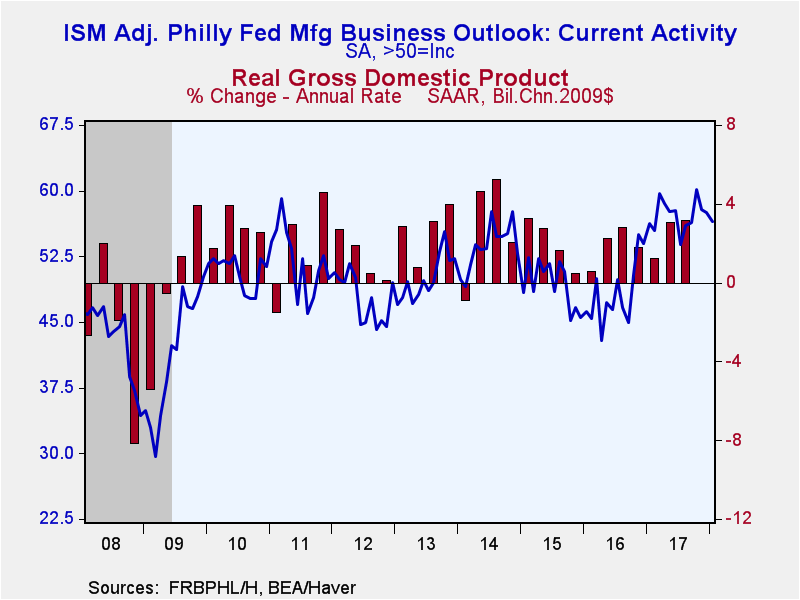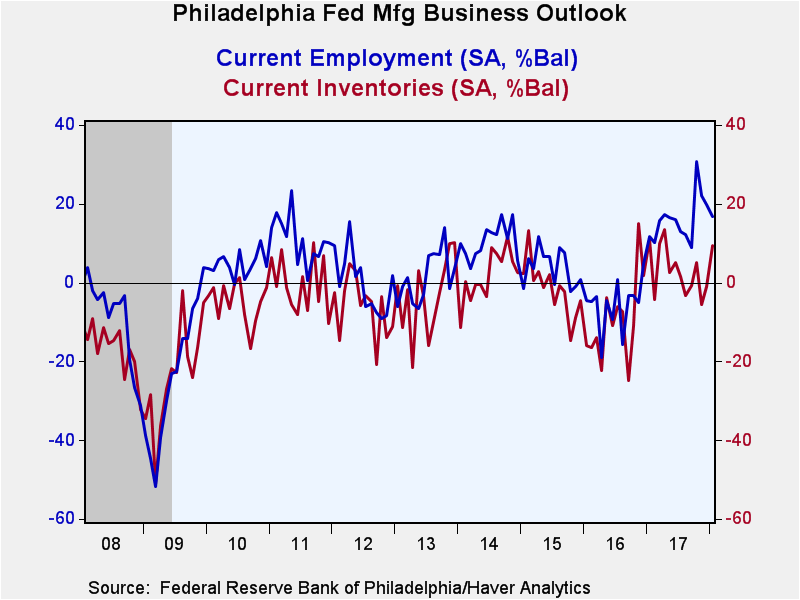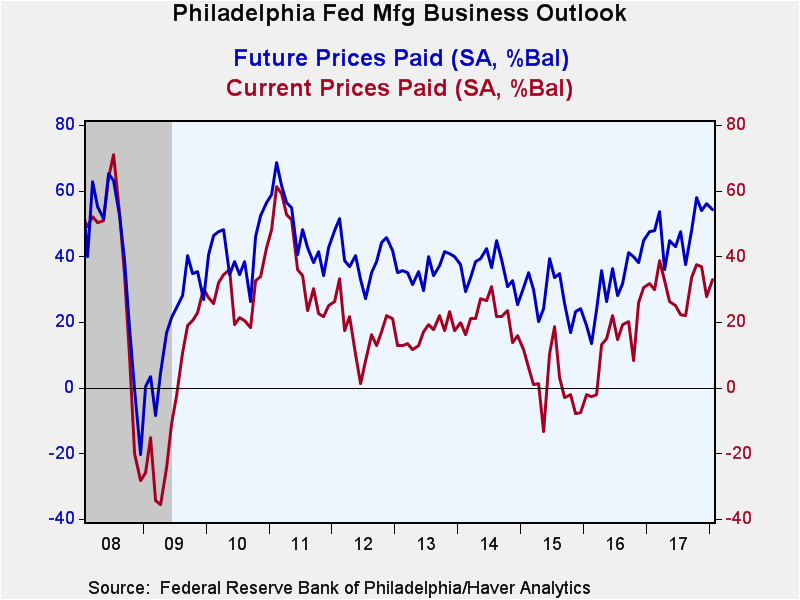 Global| Jan 18 2018
Global| Jan 18 2018Philadelphia Fed Factory Conditions Index Weakens
by:Tom Moeller
|in:Economy in Brief
Summary
The Philadelphia Federal Reserve reported that its General Factory Sector Business Conditions Index declined to 22.2 during January from 27.9 in December. Expectations had been for a reading of 25.0 in the Action Economics Forecast [...]
The Philadelphia Federal Reserve reported that its General Factory Sector Business Conditions Index declined to 22.2 during January from 27.9 in December. Expectations had been for a reading of 25.0 in the Action Economics Forecast Survey. A lessened 34% of firms reported an improvement in business activity while twelve percent reported a decrease. Figures back to 2015 were revised. This statistic is a diffusion index centered on zero. Readings above zero indicate expansion.
Haver Analytics constructs an ISM-Adjusted General Business Conditions Index. This measure fell to 56.5 this month from 57.5 during December. During the last ten years, there has been a 68% correlation between the quarterly ISM-adjusted Philadelphia Fed Index and quarterly real GDP growth.
Weakness in the January series was reflected in lower levels of the new orders, unfilled orders and delivery times indexes. Countering these declines were increases in the shipments and inventories series.
The employment index also fell to its lowest level since September. During the last ten years, there has been an 80% correlation between the index level and the m/m change in payroll employment. Twenty-four percent of respondents reported a rising level of payrolls while eight percent reported a decline. The average workweek series increased to the highest level in three months.
The prices paid index rose slightly but remained near the lowest level in five months. Thirty-three percent of respondents reported higher prices received while none reported lower. The index of prices received increased to the highest level in twelve months.
The future activity index declined to its lowest level since August. New and unfilled orders fell sharply as did inventories and the expected workweek.
The survey panel consists of 150 manufacturing companies in the third Federal Reserve District (which consists of southeastern PA, southern NJ and Delaware). The diffusion indexes represent the percentage of respondents indicating an increase minus the percentage indicating a decrease in activity. The ISM-adjusted figure, calculated by Haver Analytics, is the average of five diffusion indexes: new orders, production, employment, supplier deliveries and inventories with equal weights (20% each). Each ISM-adjusted index is the sum of the percent responding "higher" and one-half of the percent responding "same."
The figures from the Philadelphia Federal Reserve can be found in Haver's SURVEYS database. The expectation from the Action Economics Forecast Survey is available in AS1REPNA.
| Philadelphia Fed - Manufacturing Business Outlook Survey (%, SA) | Jan | Dec | Nov | Jan'17 | 2017 | 2016 | 2015 |
|---|---|---|---|---|---|---|---|
| General Factory Sector Business Conditions | 22.2 | 27.9 | 24.3 | 24.1 | 27.4 | 4.8 | 3.7 |
| ISM-Adjusted Business Conditions | 56.5 | 57.5 | 57.8 | 56.2 | 57.2 | 48.2 | 49.4 |
| New Orders | 10.1 | 28.2 | 24.2 | 24.6 | 25.4 | 4.9 | 3.0 |
| Shipments | 30.3 | 23.9 | 23.8 | 24.1 | 26.8 | 6.9 | 3.1 |
| Unfilled Orders | -1.8 | 12.8 | 16.6 | 10.2 | 11.9 | -5.6 | -5.1 |
| Delivery Time | 6.1 | 11.0 | 15.2 | 5.9 | 10.6 | -4.6 | -4.2 |
| Inventories | 9.4 | -1.1 | -5.5 | 11.0 | 2.8 | -9.6 | -1.4 |
| Number of Employees | 16.8 | 19.7 | 22.1 | 11.6 | 16.2 | -5.6 | 3.9 |
| Average Workweek | 16.7 | 12.6 | 14.9 | 8.9 | 14.9 | -5.4 | -1.7 |
| Prices Paid | 32.9 | 27.8 | 36.9 | 31.8 | 30.4 | 13.5 | 1.5 |
| Expectations - General Business Conditions; Six Months Ahead | 42.2 | 52.7 | 48.7 | 51.0 | 47.1 | 33.7 | 37.6 |
Tom Moeller
AuthorMore in Author Profile »Prior to joining Haver Analytics in 2000, Mr. Moeller worked as the Economist at Chancellor Capital Management from 1985 to 1999. There, he developed comprehensive economic forecasts and interpreted economic data for equity and fixed income portfolio managers. Also at Chancellor, Mr. Moeller worked as an equity analyst and was responsible for researching and rating companies in the economically sensitive automobile and housing industries for investment in Chancellor’s equity portfolio. Prior to joining Chancellor, Mr. Moeller was an Economist at Citibank from 1979 to 1984. He also analyzed pricing behavior in the metals industry for the Council on Wage and Price Stability in Washington, D.C. In 1999, Mr. Moeller received the award for most accurate forecast from the Forecasters' Club of New York. From 1990 to 1992 he was President of the New York Association for Business Economists. Mr. Moeller earned an M.B.A. in Finance from Fordham University, where he graduated in 1987. He holds a Bachelor of Arts in Economics from George Washington University.










